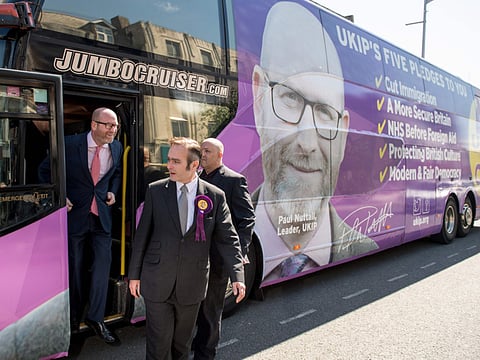Never has British politics felt so wild and unpredictable
The Conservative campaign coarsens by the day, while the U-turns and lurching polls reflect the crumbling of a system that kept voters neatly in their party silos

All eyes were still on the Andrew Neil interview — on social care, “you need to be honest, I would suggest, and tell the British people you’ve changed your mind” — when Theresa May’s free school-breakfast policy started to come unstuck. The Tory manifesto had it costed at £60 million (Dh282 million), which would buy each of the 4.62 million primary-aged children attending state schools a breakfast worth only 7 pence.
In the event that children ate ingredients in today’s prices rather than those of the Edwardian era (the last time, incidentally, anyone made the argument that one meal at the start of the day was ample provision for scallywags who should be grateful for their free lessons), the policy would cost a lot more. Cue another U-turn: the policy remained, but was henceforth uncosted, like in the olden days, when policies were a statement of values and the maths could wait. An education wag called May a “cereal U-turner”.
We are accustomed to personality politics, though its 2017 incarnation — with the prime minister sending out leaflets that don’t mention the party, preferring “myself and my team”, and the opposition leader seeking to sail into Downing Street on a wave of 20,000 Libertines fans singing his name — is pretty rum. We are less accustomed to politics in which the personalities are sold as the diametric opposite to what they are.
A woman who changes her mind on everything, and days after she’s said something says the opposite, is running as the immovable rock in a turbulent world, while a man who hasn’t knowingly changed his mind on anything since 1983 is presenting as the pluralist, the one who can listen.
All restraints removed
All the restraints on political discourse, which force the elegant manoeuvres where you soften or pad out or re-contextualise reality so that it better fits your story, have been removed. To say the opposite of what is true is now more than acceptable: it amounts to a core strategy. Psephologists scratch their heads about the shape of a Conservative victory — obviously they’ll win, but what will a real win look like? Is 80 seats enough to give this election a patina of purpose? What about 40? But we know full well that they’d take a victory of 15 and call it a landslide.
As if that weren’t coarsening enough, we’re now entering the Lynton Crosby phase of the campaign, where all human decency steps aside lest it be covered in the slurry spraying from his wheel-spin of personal attack and nonsensical insinuation.
From the outside, it has always looked a bit preposterous, trying to amplify the dark, implacable terrorist leanings of a man in a cardigan who just wanted a better deal for the people at the bottom of the heap. But until last weekend I had only looked at how the unpatriotic, IRA-sympathising shtick misrepresented Corbyn.
As surely as there are progressives who feel politically homeless — soft left remoaners, centre-left internationalists, right-ish left pragmatists — there are conservatives who feel homeless too. Tories who believe in the international order; Tories who don’t miss the empire; Tories who respect free markets, but like them fettered by reasonable institutions; Tories who have no desire to turn the UK into the Grand Cayman Islands; Tories who think a little bit of state intervention — for instance, when you are struck down at random with an illness that is cruel enough without a price tag — is a good thing; Tories who are socially liberal; Tories who believe in free movement; these Tories have no place in Theresa May’s rhetoric.
Maybe that’s why she’s dropped “Conservative party” from her literature — not because the brand is off-putting to the wider public, but because she knows she’s a hair’s breadth away from baiting her party into a full-throated “no”. She is not, by any definition I can think of, a conservative. No amount of nostalgia can disguise her radicalism.
It is precisely because of this homelessness, on both sides, that 2017’s general election feels so different. This time, the polls are wild: Wales can go from unprecedentedly Conservative to unbreachably Labour overnight. May’s double-digit lead, always considered so secure, was suddenly in single digits. And even while it is still greater than any enjoyed by David Cameron, it feels more precarious, as the volatility undermines every confidence.
There’s an atmospheric sense that we all have skin in the game: to lose one’s political home is also to be liberated from fortress politics, the dispiriting feeling that politicians are safe behind high walls, quite capable of making decisions with or without the voter.
May’s calculation has been to lean in to the unpredictability, use it to stoke fear: “If we lose just six seats, Jeremy Corbyn could become prime minister,” a recent Facebook statement (inaccurately) claimed. She has not factored in that, in this campaign of cack-handed, ad hominem jousting, the feeling that nothing is certain and anything could happen may have generated more energy and urgency than any party’s thin authority will know what to do with.
— Guardian News & Media Ltd
Zoe Williams is a Guardian columnist.


